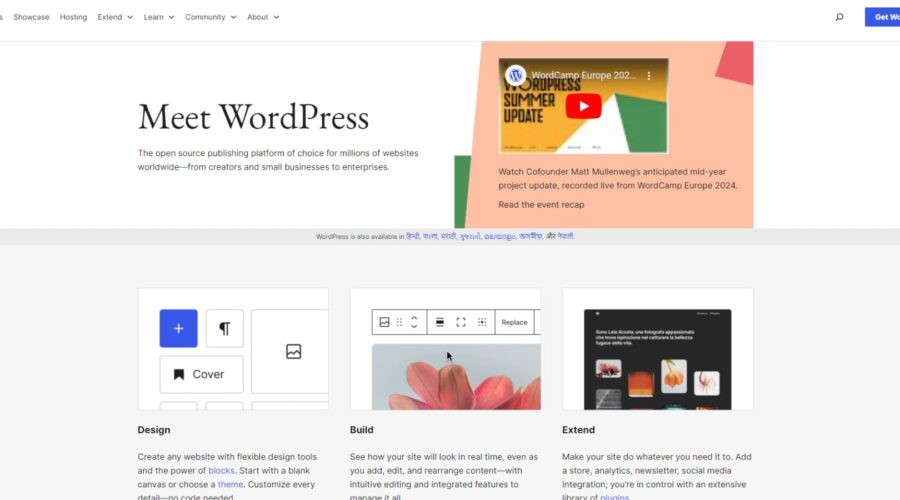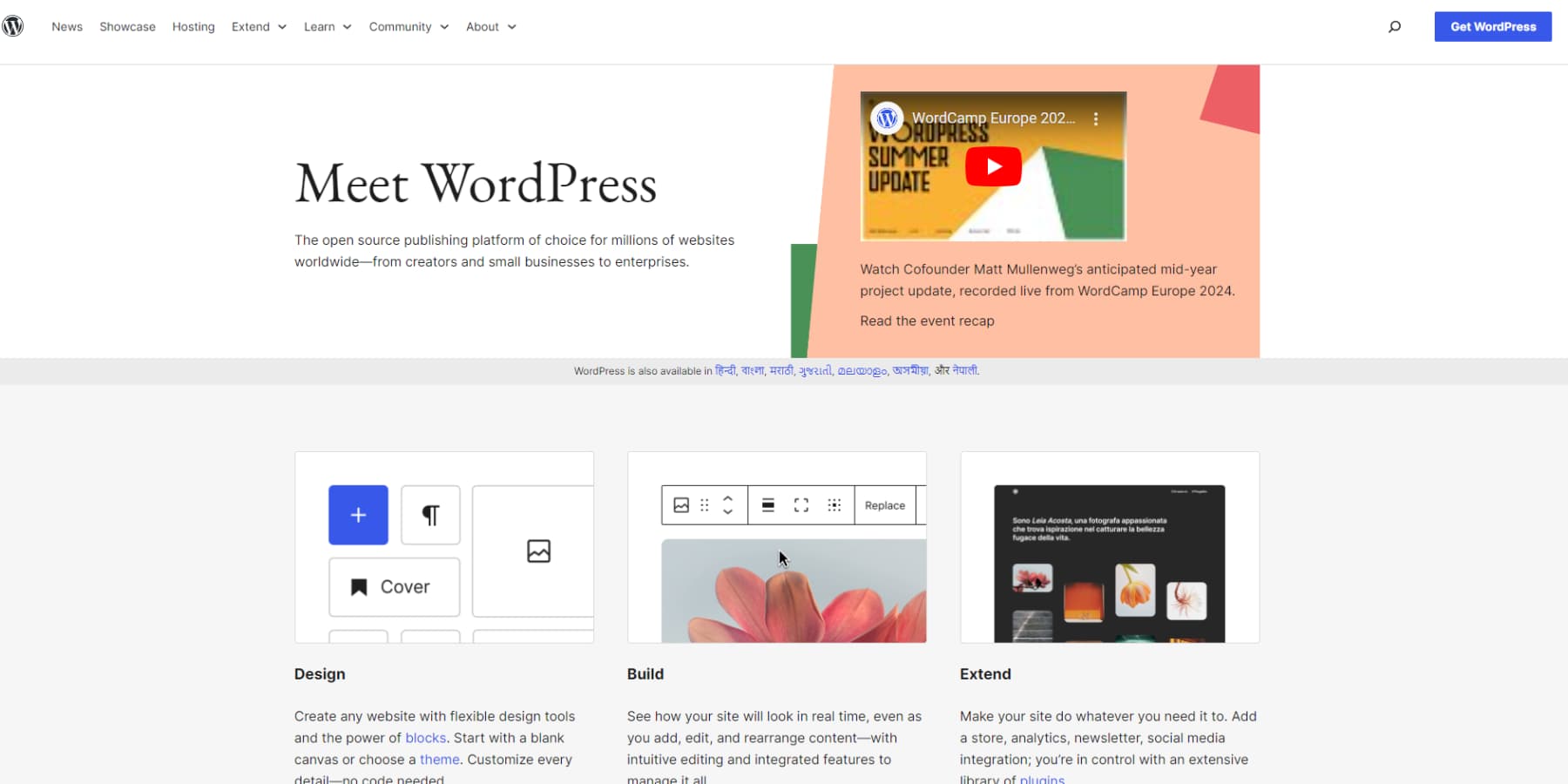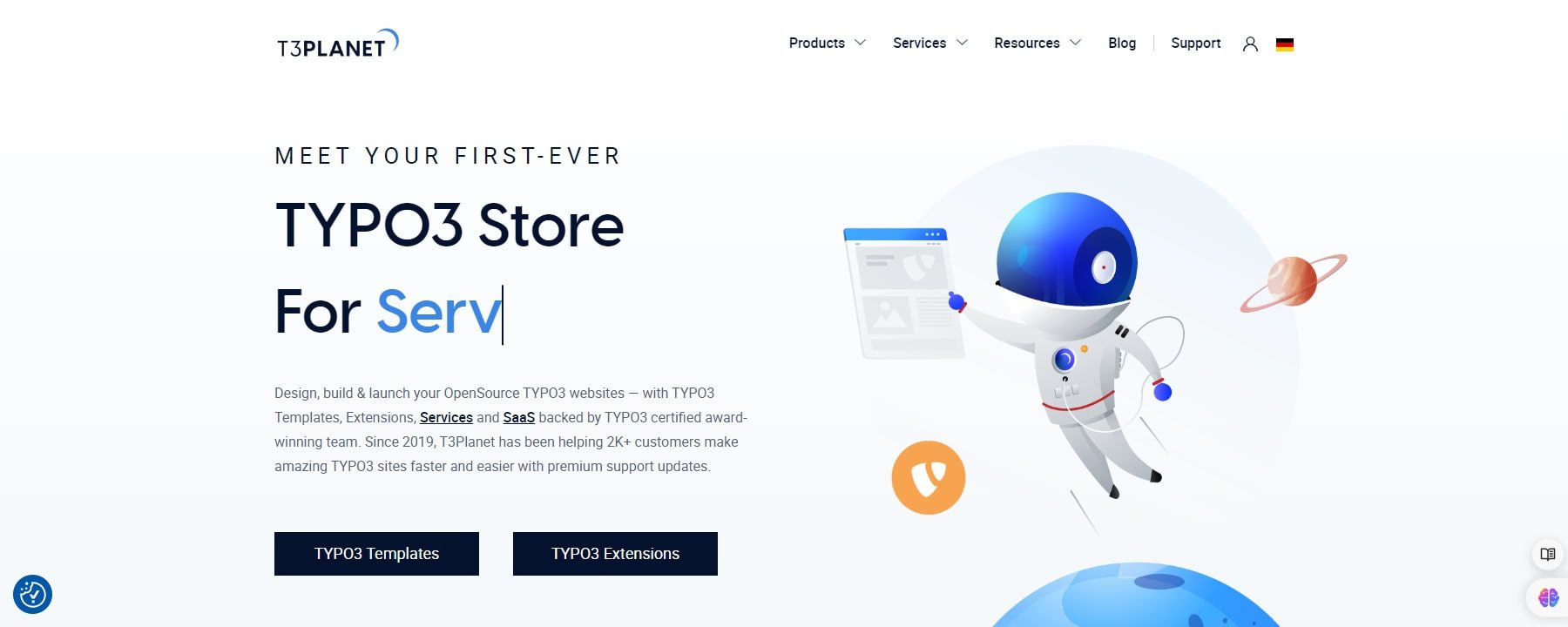Are you struggling with a budget when building a website for your small business? Check out our list of the best open-source website builders in 2024.
By opting for open-source solutions, one can save on licensing fees and invest the saved funds in other critical areas of the project. Open-source builders offer free access to their software with affordable hosted solutions, which is great for small businesses on a budget. This guide will help you find their special features and pick the best one for your business. Let’s get started.
Understanding Open-Source Website Builders
Open-source website builders are web development tools that help you create websites. The software is free, and its code is open for everyone to see and change. This means you can look at how they work, make changes, and share your version with others. Many offer hosted solutions for their platform to handle your domain and hosting all in one place.
These builders are popular because they are flexible and customizable. A community of developers helps to improve them by adding new features and fixing problems. You can find many themes and plugins to make your website look and work how you want.
What to Look for in Open-Source Website Builders
Choosing the right open-source website builder is crucial for creating a robust and scalable web presence. The ideal platform should offer a balance of ease of use, flexibility, and strong community support to ensure your website can grow and adapt over time. Here are key factors to consider when selecting an open-source website builder:
- Dedicated Support: Look for open-source software with a dedicated community following and developers who regularly update it. This ensures the platform will be safe to use in the future.
- Ease of use: Look for an intuitive interface with drag-and-drop functionality that simplifies the design process. Comprehensive documentation and tutorials are also essential to help users get started quickly.
- Templates: Templates serve as pre-designed blueprints for web pages. They are essential for responsive layouts, adapting seamlessly to different screen sizes. Responsive templates ensure your website looks good on both desktop and mobile devices. They adjust layouts, fonts, and images to fit screen sizes.
- Plugins: They can provide features like contact forms, online store tools, SEO controls, and enhanced security. However, choose plugins carefully to avoid conflicts and potential malware. Use industry-recommended plugins to ensure safety and reliability.
- Upload of images: A good website builder makes it easy to upload images in formats like PNG, GIF, JPEG, and SVG. It should also allow you to effortlessly replace default layout images and backgrounds.
- Themes and colors: Themes form the foundation of your website’s design. They offer variations in numerous built-in options, such as layouts, colors, and columns. Select a theme that matches your website’s specifications. Poorly coded themes can slow your site and negatively impact SEO and responsiveness.
While surfing the internet, you will find many popular options with unique strengths. Evaluate them based on these criteria to find the best fit for your needs.
Top Open-Source Website Builders
We reviewed open-source website builders by exploring documentation, engaging with online communities, and testing the tools ourselves. This list combines our hands-on experience with insights from the broader community.
1. WordPress
Best Open-Source Website Builder for Flexibility
WordPress is a powerful and versatile open-source CMS and website builder that currently empowers 43% of websites worldwide. The software can be downloaded and used for free on WordPress.org for self-hosting, the preferred method for building any website with limitless flexibility. However, you can also use their all-in-one Saas solution, WordPress.com, if you want a more streamlined onboarding process with more limitations.
WordPress (.org) delivers comprehensive website-building solutions. With 30,000 customizable themes and 58,000 plugins, users can easily tailor their sites to their needs. WordPress also provides strong content management tools, SEO optimization, and integration with third-party services.
Due to its widespread use, plenty of WordPress hosting providers can get your site up and running for just a few bucks a month or free.
WordPress + Divi
Some of the best themes, like Divi, can enhance the process of building a WordPress website above and beyond the default block editor.
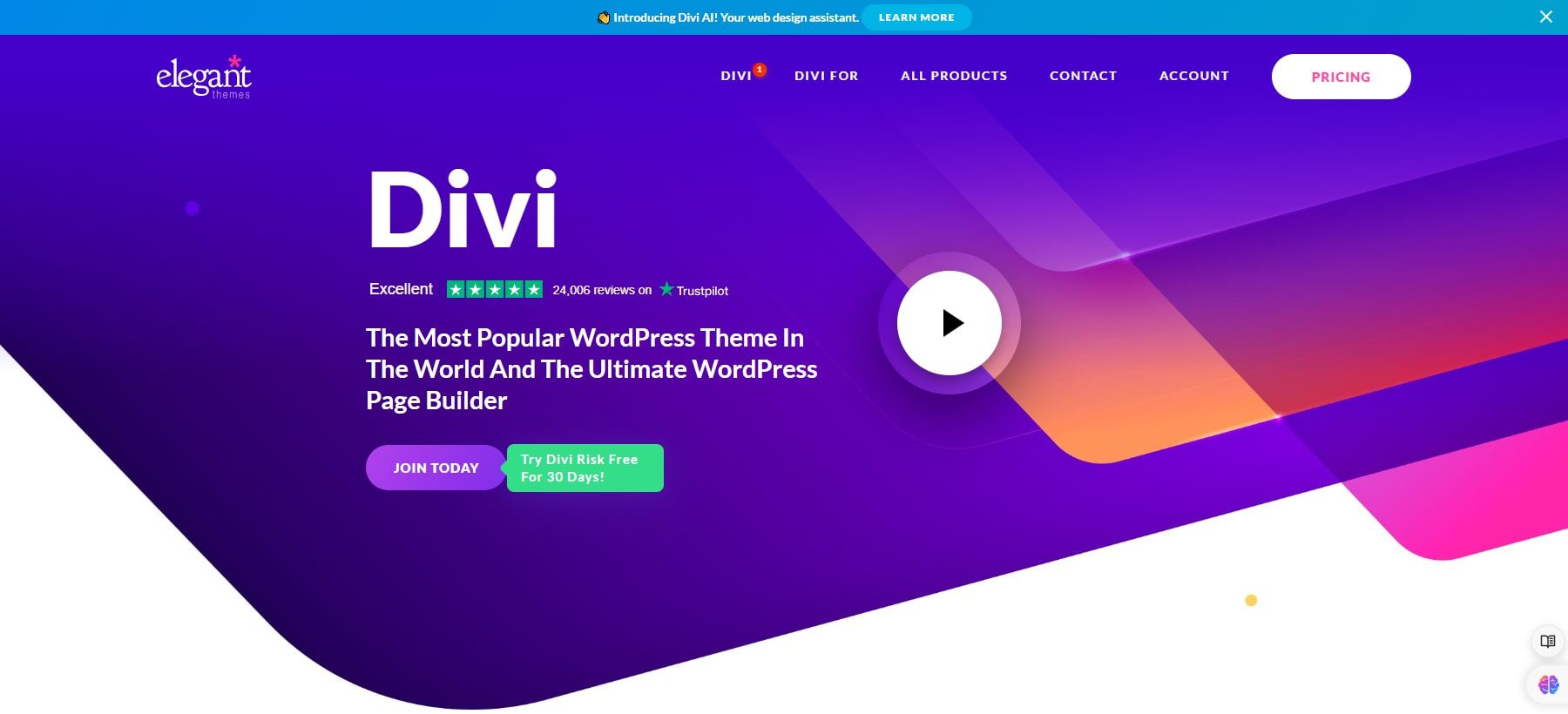
Divi is a versatile theme and website builder that offers extensive customization options. It includes:
- Visual Page Builder- a drag-and-drop interface allowing users to design their pages visually in real time without coding.
- Theme Builder – build and manage all of your global site templates (blog posts, page categories, WooCommerce pages, etc.) using the visual builder and dynamic content modules.
- Divi AI – a powerful AI website builder integrated into the theme that can automatically generate entire sites, sections, images, and text to fit your brand.
- 200+ content modules – including sliders, forms, galleries, and more.
- 300+ website templates and starter sites – choose from thousands of layouts to jumpstart your designs
With Divi AI, you can generate a complete website in 2 minutes.
So, if you are worried about spending countless hours and money developing your site, don’t sweat it. With WordPress, it’s all about finding the right theme and plugins to do all the heavy lifting for you. Regarding open-source builders, it is hard to compete with WordPress.
What We Like About WordPress
- Extensive Theme Library: With over 30,000 free and premium themes available, WordPress enables users to easily customize the appearance of their websites.
- Plugin Ecosystem: It boasts over 58,000 plugins that extend its functionality. Installing and activating plugins allows users to enhance their websites with features like SEO tools, contact forms, eCommerce capabilities (WooCommerce), social media integration, and more.
- Gutenberg Block Builder: The Gutenberg block builder revolutionizes content creation with its intuitive, drag-and-drop interface. Users can easily add, arrange, and style various content blocks, such as text, images, videos, and widgets, without coding knowledge.
- Regular Updates: This platform is continuously updated to improve security, functionality, and performance. Users benefit from these regular updates by accessing the dashboard and checking the themes/plugins that must be updated.
- Customization and Control: The WordPress Customizer and Block editor allows users to efficiently manage and organize their website content. Moreover, features like content scheduling, revision history, and media management make creating and maintaining a dynamic and engaging website easy.
What Can Be Improved
- Security Concerns: Due to its popularity, WordPress sites are frequent targets for hackers. Despite providing regular updates and effective security plugins, a more robust security framework could be beneficial.
Why We Picked It
WordPress allows users to add virtually any functionality without extensive coding. Its vast array of themes provides unparalleled design versatility, and the built-in Customizer tool enables extensive design modifications. The user-friendly content editor, Gutenberg, and a robust media library simplify content creation and management.
Who Is WordPress Best For?
WordPress is best suited for bloggers, small businesses, and non-technical users. Its user-friendly interface, extensive library of plugins and themes, and large community support make it ideal for those without technical expertise. Small businesses benefit from its flexibility and customization options, while its built-in SEO features are particularly advantageous for bloggers looking to enhance their search engine rankings.
Community Reviews and Ratings
Users on platforms like G2, Capterra, and Sitejabber commend WordPress for its open-source flexibility and wide range of customization features.
Pricing
WordPress.com offers a free version and paid plans starting at $9 per month. (hosting included). WordPress.org software is free to use with affordable hosting providers like SiteGround.
2. Umbraco
Best Open-Source Website Builder for Scalability

Umbraco is a powerful, flexible, open-source website builder designed to help businesses create and manage dynamic websites. It offers a robust platform enabling developers and content creators to build custom web solutions tailored to their needs. With its intuitive user interface, Umbraco makes it easy for users to manage content without extensive technical knowledge. The platform supports various features, including advanced media management, seamless integration with third-party applications, and a rich plugin ecosystem for extensive customization. Additionally, Umbraco’s scalability ensures it can grow alongside your business, accommodating everything from small blogs to large enterprise websites.
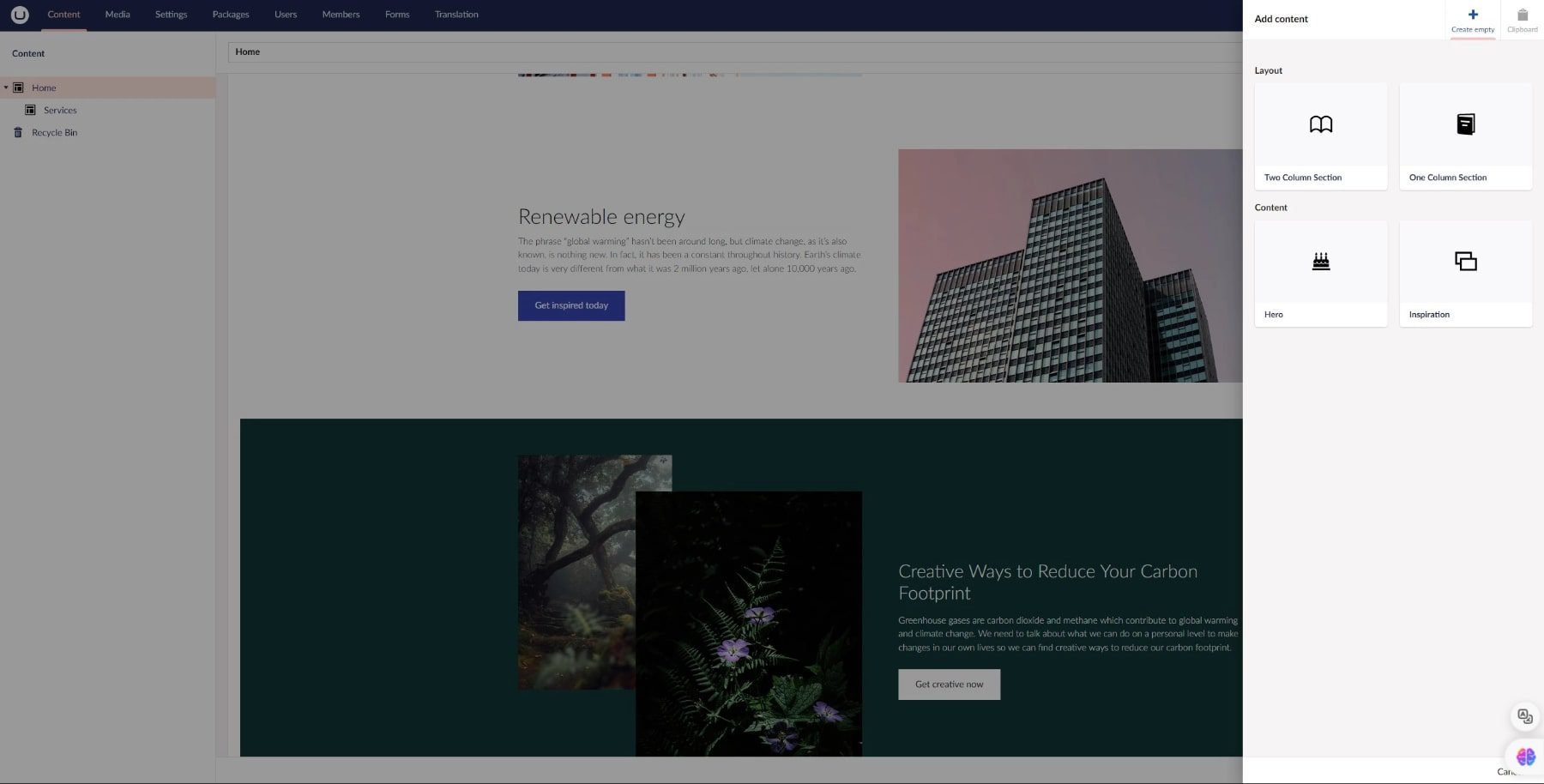
The Grid Editor allows users to create complex, responsive layouts without writing a single line of code. This highly customizable drag-and-drop interface effortlessly enables users to build and rearrange content blocks. The Grid Editor simplifies content creation and ensures consistency across the website, making it easier for teams to collaborate and maintain a unified design language.
What We Like About Umbraco
- Flexible Content Management: Umbraco allows you to publish news, images, campaigns, and various other types of content effortlessly without the need to write any code. You can revisit your work anytime and benefit from automatic publishing features.
- Scalable and Reliable Hosting: Umbraco Cloud’s hosting infrastructure ensures reliable performance and scalability as a hosted platform. Users benefit from automatic updates, security patches, and regular backups, ensuring a secure and up-to-date site.
- Content Audit: The platform provides robust version control, ensuring your content is never lost. If you need to undo changes or revert to a previous version, you can easily roll back to an earlier version of your content.
- Ecommerce Integration: Umbraco Commerce add-on sets up an online store with integrated eCommerce features, including shopping cart functionality, payment gateways, and inventory management.
- Automatic Cropping of Images: It ensures your images look great across all formats, including a blog page, social media post, or website header. Its responsive image management features automatically adjust and optimize images for different display contexts.
What Can Be Improved
- Not Enough Plugins: Unlike other open-source website builders, such as WordPress, this platform does not offer many plugins. However, Umbraco 8 can influence this and make it a priority.
Why We Picked It
Umbraco offers a flexible content management system that can accommodate small websites and large, complex applications. Its customizable backend can be tailored to meet specific project needs, and the platform’s strong API support facilitates seamless integration with other systems and services.
Who Is Umbraco Best For?
Umbraco is highly suitable for developers, large enterprises, and tech-savvy users. Known for its flexibility and scalability, it is ideal for large enterprises that require tailored solutions and can handle complex content structures. Umbraco offers a developer-friendly environment with a robust API appealing to technical users.
Community Reviews and Ratings
Umbraco is renowned for its powerful and flexible content management features. Users praise its scalability and customization options, noting the platform’s ability to easily handle complex websites.
Pricing
Umbraco is free to use, and its pricing plans start at $43.56 per month. The suggested hosting providers for this platform include Hostinger and Kamatera.
3. T3Planet
Best Open-Source Website Builder for User Experience
T3Planet is a robust and dynamic platform that redefines how we create and manage websites. It offers a comprehensive suite of tools and features to streamline web development. T3Planet supports seamless integrations and responsive design and offers a powerful content management system (CMS) that ensures flexibility and scalability. Additionally, it provides advanced SEO tools, multilingual support, and robust security features.
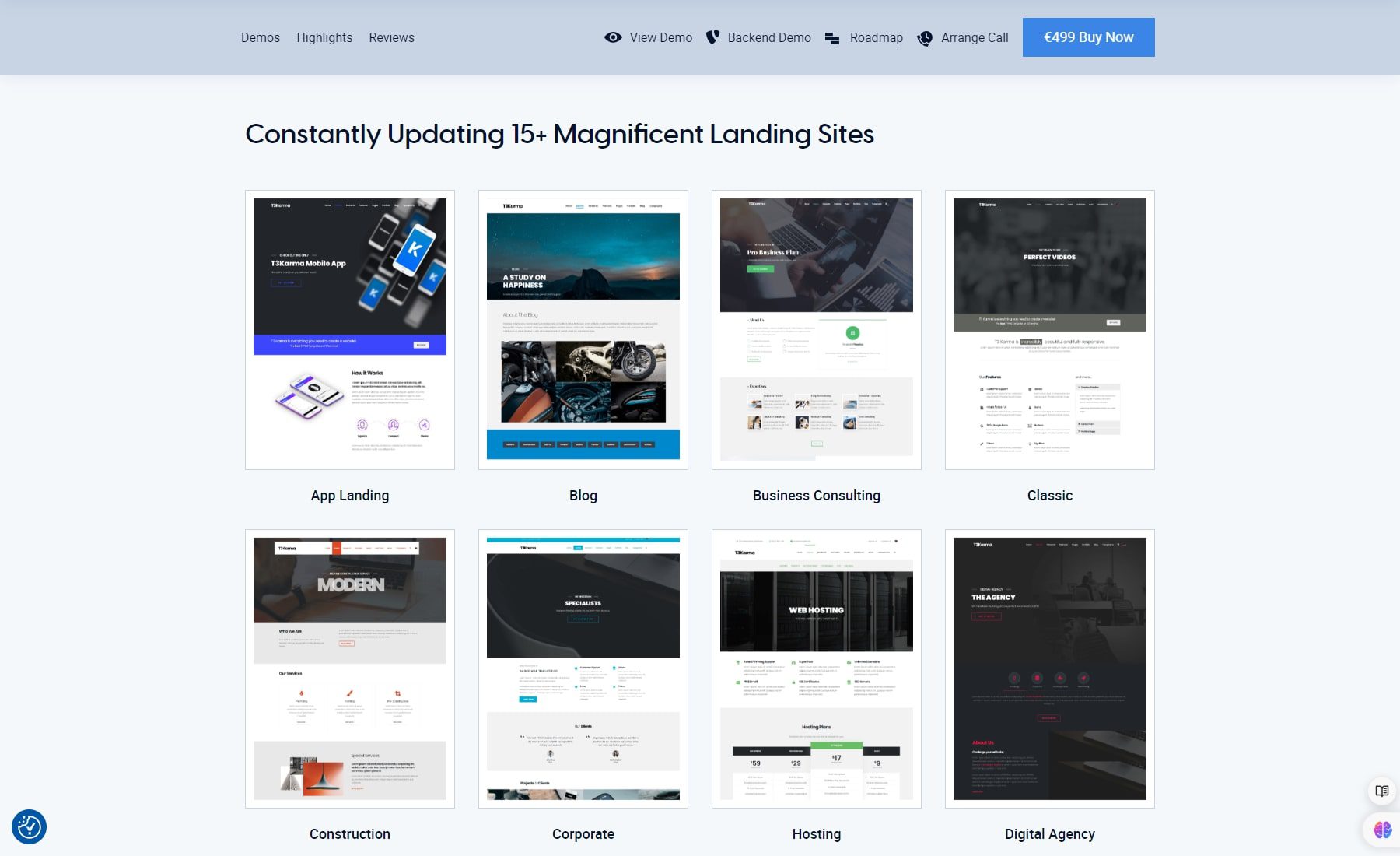
T3Planet’s extensive template library allows users to choose from many professionally designed templates tailored to different industries and needs. Templates are available in multiple categories, such as corporate, eCommerce, and portfolio.
What We Like About T3Planet
- Extensive Template Library: T3Planet provides a vast collection of pre-designed templates. It has more than 150 custom TYPO3 elements and 15 pre-built demos.
- Built-In SEO Tools: This platform can become your SEO technical partner, overseeing your projects individually. It also provides content optimization support, such as on-page optimization.
- Efficient Backend Management: An editor-friendly TYPO3 backend allows developers to access and modify the source code. This flexibility enables advanced customization and the integration of third-party plugins and extensions.
- Ecommerce Ready: With built-in eCommerce capabilities, this platform allows users to easily set up online stores. Features such as product catalogs, shopping carts, and payment gateways are included.
What Can Be Improved
- Performance Optimization: While T3Planet offers many features, website performance can be improved. Faster load times and better resource management could enhance user experience, especially for content-heavy sites.
Why We Picked It
T3Planet has a highly intuitive drag-and-drop interface, which simplifies site-building. Its templates are fully responsive. The platform includes a rich library of pre-built elements and modules. Lastly, T3Planet’s integrated SEO features help optimize content for search engines.
Who Is T3Planet Best For?
T3Planet is designed for Joomla users and developers. Built on the T3 Framework, it integrates seamlessly with Joomla, making it perfect for those already using or planning to use this CMS. It offers advanced customization options, ideal for developers creating complex websites. Additionally, the wide range of templates available caters to countless industries.
Community Reviews and Ratings
T3Planet stands out for its user-friendly interface and seamless integration capabilities. Users appreciate its intuitive design and the ease of creating and managing content.
Pricing
T3Planet offers a free trial, and its pricing plans start at $86 per month. The hosting options for this website builder include Platform.sh and Brightside.
4. Webstudio
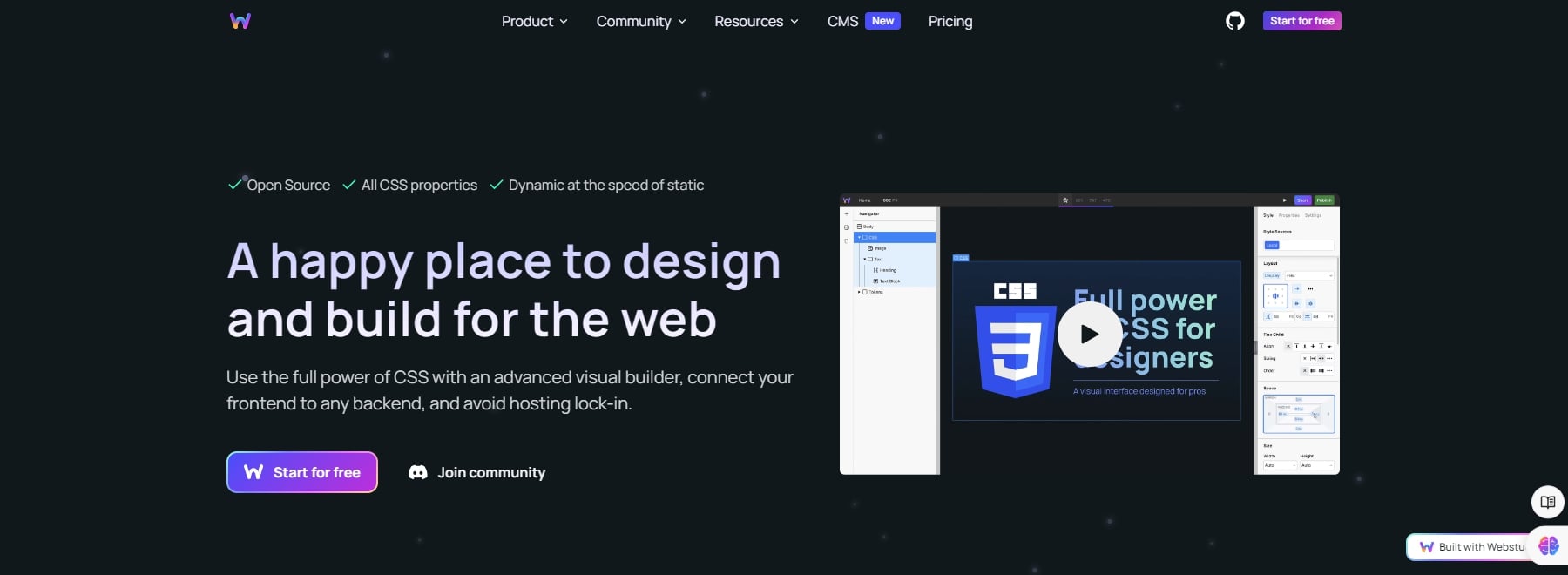
Webstudio is one of the best open-source alternatives to Webflow. It is a comprehensive builder designed to simplify web design without locking users into a specific host. It offers unparalleled flexibility and control, enabling users to create stunning websites without extensive coding knowledge. Its extensive library of pre-designed templates and customizable elements ensures users can quickly create unique, professional-grade websites. Additionally, Webstudio supports a handful of plugins and integrations.
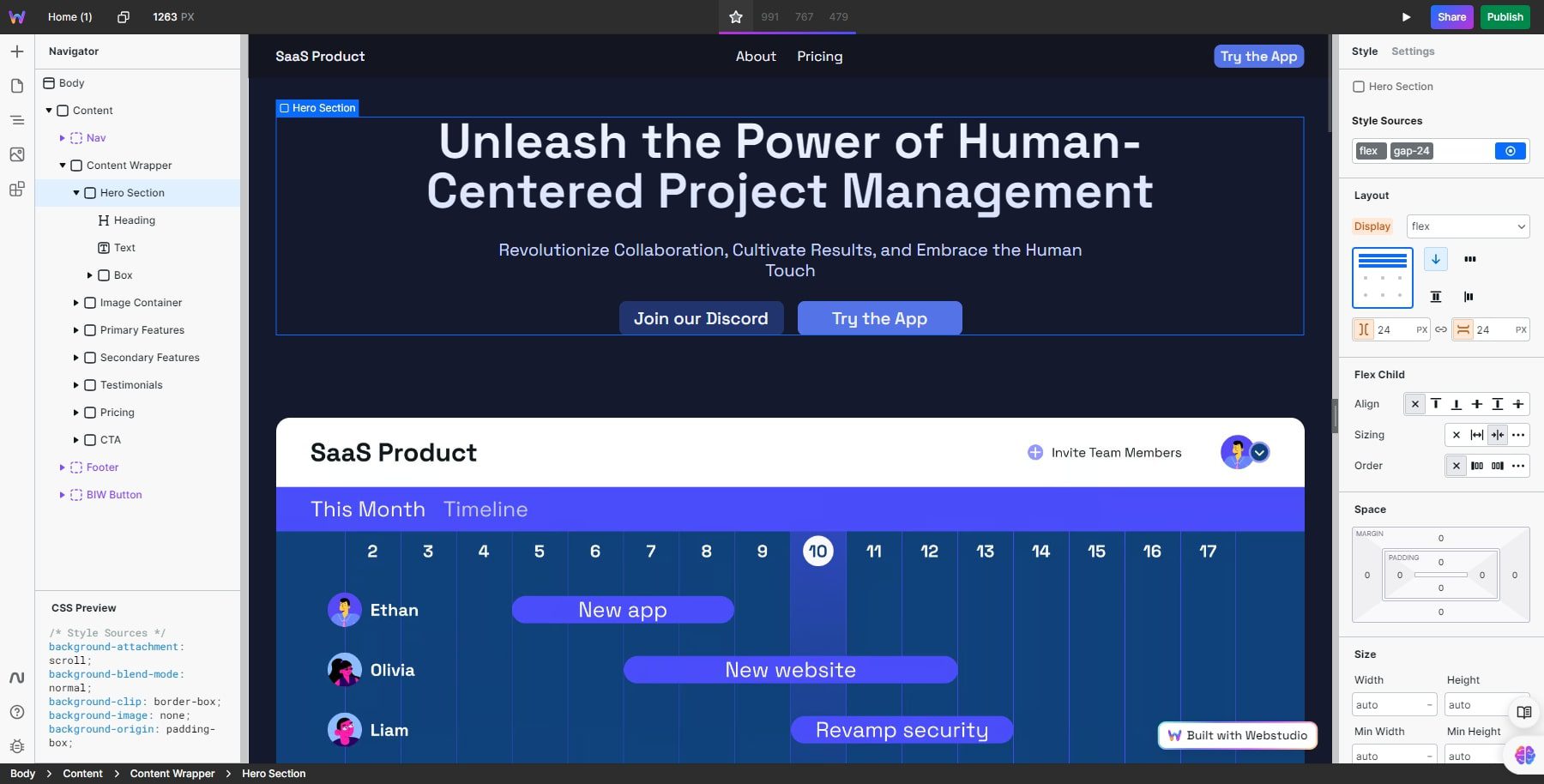
This platform’s real-time collaborative editing capabilities make it preferable. It ensures that users can edit pages and sections on the front end. This streamlines the web development process, reducing the need for back-and-forth communication and ensuring that updates and changes are instantly visible to all team members.
What We Like About Webstudio
- Efficient Style Management: Webstudio simplifies style management by allowing users to attach styles to Tokens, which can be easily added, deleted, or reordered. Additionally, the platform features local styles for on-the-fly design without creating tokens or naming styles. Users can seamlessly convert Local Styles into reusable Tokens.
- Influence of AI: It uses AI technology to transform voice or text input into website components and styles. Users can build their websites by simply speaking or typing their design preferences, and the AI will automatically translate these prompts into functional elements and styles.
- Cloud-Based CMS: With cloud-based CMS, you can manage your website content from anywhere, ensuring real-time updates and changes.
- Advanced Customization: It allows users to define custom breakpoints for precise control over responsive design. Additionally, users can upload custom fonts, including variable fonts, directly into the platform.
What Can Be Improved
- Suitability for Coding Experts: Webstudio is primarily suited for coding professionals, as certain features, such as animations, need coding with GSAP.
Who Is Webstudio Best For?
Webstudio is tailored for designers and creative professionals, focusing on creative freedom and visual aesthetics. It offers a user-friendly interface that allows designers to create visually appealing websites without deep coding knowledge. Extensive design customization options benefit creative professionals looking to showcase their work. Additionally, collaborative tools included in Webstudio support team projects, making it an ideal platform for design teams.
Pricing
Webstudio is free to use, and its pricing plans start at $20 per month. You can also export your Webstudio projects as a static HTML site to be self-hosted on most hosting platforms.
5. GrapesJS

GrapesJS is a versatile web builder framework designed to help users create and manage HTML templates without requiring extensive coding knowledge. It boasts a user-friendly drag-and-drop interface, enabling seamless editing and layout customization. Its component-based architecture allows users to create reusable content blocks, streamlining the design process and ensuring project consistency. Additionally, the framework supports responsive design, ensuring that websites look great on any device. With built-in tools for managing styles and assets, GrapesJS simplifies the web development workflow.
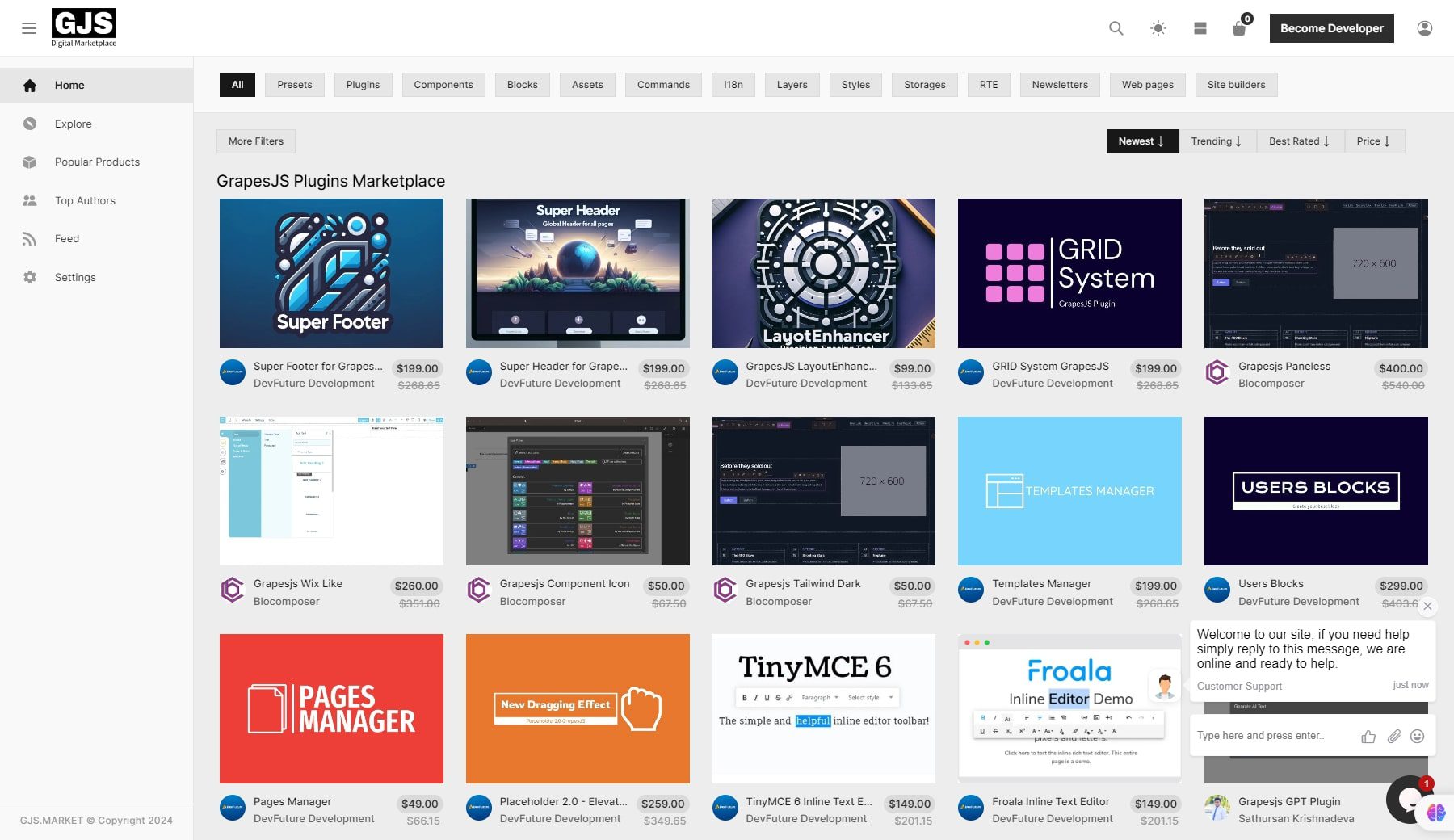
GrapesJS’s robust and extensible plugin system allows developers to easily add new functionalities and integrate third-party services. By using plugins, users can expand GrapesJS’s core features to include advanced forms, custom scripts, and interactive elements. The plugin ecosystem promotes a collaborative community where developers can share and access countless tools and enhancements.
What We Like About GrapesJS
- Built-In Code Editor: This platform includes a built-in code editor for advanced users that enables the customization of HTML, CSS, and JavaScript directly within the platform.
- Asset Manager: Save and manage media content, which can be reused across multiple projects. You can double-click on images to make changes.
- Extensive Styling: The Styling manager ensures users can easily design complex layouts. You can also go through the CSS properties of those components to achieve the desired results.
- Real-Time Preview: Users can see changes instantly as they make edits. This immediate feedback helps in refining designs on the fly and ensures the final product matches the user’s vision.
What Can Be Improved
- Limited Pre-Built Templates: While GrapesJS provides a robust website framework, it lacks a wide selection of pre-built templates. Without a diverse template library, new users may struggle to start quickly.
Who Is GrapesJS Best For?
GrapesJS caters to developers and technical users. Its design emphasizes deep customization and control over website building, making it perfect for developers. It integrates seamlessly with custom code, allowing technical users to implement specific functionalities. GrapesJS’s component-based architecture benefits developers looking to create reusable elements, and its flexibility and extensibility make it suitable for building complex and custom web applications.
Pricing
GrapeJS is free to use. It is typically used as a front-end editor and can be hosted on platforms supporting custom web applications, such as Codesphere.
What are the Best Open-Source Website Builders?
Exploring open-source website builders can be a great option if you’re looking to build a website without breaking the bank. These tools offer flexibility and customization, allowing you to create a site that perfectly suits your needs. To help you navigate the numerous choices available, we’ve curated a few comparison tables of the top open-source website builders.
Feature Comparison of the Best Open-Source Website Builders
The best open-source website builders share several key features: they offer extensive customization options, have a user-friendly interface, and provide robust community support. These platforms allow for flexible design and seamless integration with various tools and often come with a wide range of plugins and extensions to enhance functionality.
| WordPress | Umbraco | T3Planet | |
|---|---|---|---|
| Extensive plugin ecosystem | ✔️ | ✔️ | ❌ |
| Customizable themes | ✔️ | ✔️ | ✔️ |
| Large community support | ✔️ | ✔️ | ❌ |
| Multilingual support | ✔️ | ✔️ | ✔️ |
| Drag-and-drop page builder | ✔️ | ❌ | ✔️ |
| Starting Price | $9/month | $43.56/month | $86/month |
| Try WordPress | Try Umbraco | Try T3Planet |
Best Open-Source Website Builders: Price Comparison
Open-source website builders have different pricing models. While they are generally free to use, some may offer optional premium features or paid add-ons. The table below compares our top open-source website builders based on their base cost, optional upgrades, and overall value.
| Open-Source Website Builders | Starting Price | Suggested Hosting Providers | Community Ratings | ||
|---|---|---|---|---|---|
| WordPress | $9 per month | Bluehost, SiteGround, and WP Engine | ⭐⭐⭐⭐(4.5/5) | Visit | |
| Umbraco | $43.56 per month | Hostinger and Kamatera | ⭐⭐⭐⭐(4.5/5) | Visit | |
| T3Planet | $86 per month | Platform.sh and Brightside | ⭐⭐⭐⭐⭐(5/5) | Visit | |
| 4 | Webstudio | $20 per month | Hostinger and GoDaddy | N/A | Visit |
| 5 | GrapesJS | Free | Codesphere | N/A | Visit |
WordPress is our top choice for the best open-source website builder. It is user-friendly and offers a vast array of powerful tools and plugins that allow you to create and manage any type of website. If you are a developer or designer looking to build professional-grade sites, T3Planet is a robust platform with advanced customization options. On the other hand, Umbraco provides a powerful open-source solution for those seeking a scalable open-source website builder that can cater to a wide range of web development needs.
Want to build your first website? You should be able to select your preference in our list of best website builders.
Frequently Asked Questions (FAQs)
To conclude, let’s address some common questions about the best open-source website builders. Do you have more questions? Leave a comment below, and we’ll provide the information you need!
What is the best open-source website builder for beginners?
Are open-source website builders secure?
Can I use open-source website builders for eCommerce?
Do open-source website builders support SEO?
How do I choose the right open-source website builder?
The post 5 Best Open-Source Website Builders in 2024 (Top New Picks) appeared first on Elegant Themes Blog.
